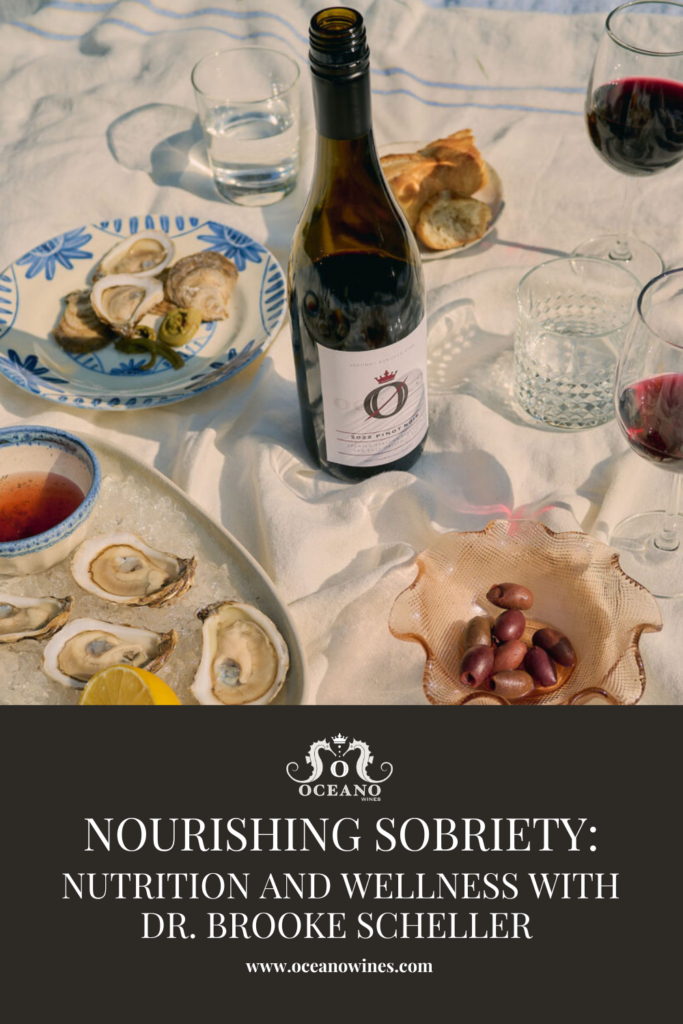On January 18, Oceano Wines hosted a special event, ‘The Art of Mindful Imbibing,’ a celebration of mindful drinking and nutrition and wellness. During this gathering, I had the privilege of sitting down with our esteemed guest, Dr. Brooke Scheller—a trailblazer in the field of clinical nutrition and the author of “How to Eat to Change How You Drink.” As a founder, CEO, and author, Dr. Brooke stands as a pioneer in the world of health, wellness, and Functional Sobriety.
The significance of nutrition and wellness on the journey to sobriety cannot be overstated. In our enlightening conversation, Dr. Brooke explores the science behind nutrition, the impact of alcohol on our bodies, and the profound health benefits of sobriety. Join us as we unravel the fascinating connection between nutrition and sobriety, drawing insights along the way from the expertise of Dr. Brooke.
Alcohol: The Fourth Macronutrient

Many consider alcohol an indulgence—simply a separate entity or treat—with little consideration on the impact it has on our nutrition and wellness.
But Dr. Brooke encourages us to look at alcohol as a macronutrient. Since alcohol provides calories—just like proteins, carbs, and fats—some have classified it as the fourth macronutrient. By categorizing alcohol as a macronutrient, Dr. Brooke prompts us to recognize its significant impact on our overall nutrition and wellness. Traditionally, alcohol is often treated as an isolated component, detached from our broader dietary considerations. However, Dr. Brooke invites us to understand that, like the other macronutrients, alcohol has a substantial influence on our body’s functioning. Understanding alcohol as a macronutrient prompts a more holistic approach to nutrition and wellness, where its effects are factored into the larger picture of our dietary habits and health outcomes.
The Role of Magnesium
Alcohol consumption impacts the way our bodies absorb and utilize many key nutrients. One such nutrient is magnesium—the body’s indispensable relaxing mineral. Alcohol consumption contributes to magnesium deficiencies. Magnesium deficiency is a prevalent concern in the United States, with approximately 70% of the population reported to be deficient in this vital nutrient.
This deficiency has far-reaching consequences, affecting not only relaxation but also sleep and overall well-being.
In the pursuit of Functional Sobriety, Dr. Brooke dismantles the prevailing belief in alcohol as a relaxant and places a spotlight on the crucial role of magnesium. Magnesium is a mineral involved in numerous physiological functions, including muscle and nerve function, blood sugar regulation, and bone development. It acts as a natural tranquilizer, promoting a sense of calm and relaxation. When deficient in magnesium, individuals may experience heightened stress levels, difficulty unwinding, and disrupted sleep patterns.
When that happens, many turn to alcohol to relax. While that may provide a short-term fix, Dr. Brooke warns us of the long-term effects of regular alcohol consumption.
To address magnesium deficiency and foster relaxation without turning to alcohol, Dr. Brooke recommends incorporating magnesium-rich foods into your diet or considering magnesium supplements. Foods such as leafy greens, nuts, and seeds are excellent sources of magnesium. Leafy greens, including spinach and kale, provide a nutrient-dense way to enhance magnesium levels. Additionally, nuts like almonds and cashews, as well as seeds such as pumpkin and sunflower seeds, contribute to magnesium intake.
The emphasis on magnesium within the context of Functional Sobriety is not just about addressing deficiencies but also about recognizing the profound impact this mineral has on our ability to relax and unwind. By understanding the prevalence of magnesium deficiency and taking proactive steps to enhance magnesium intake, individuals can pave the way toward achieving a state of relaxation that is not dependent on alcohol.
Cortisol Unveiled: How Alcohol Increases Stress

While many turn to alcohol as an aid in relaxation, Dr. Brooke warns that it actually has the opposite effect. Cortisol, known as the body’s stress hormone, plays a crucial role in regulating various physiological processes, including metabolism and the body’s response to stressors. Contrary to the common belief that alcohol acts as a relaxant, Dr. Brooke emphasizes that alcohol consumption triggers an increase in cortisol production, contributing to elevated stress levels.
Did you know that it takes approximately seven days for the body to reset cortisol levels to their baseline after a single episode of drinking? This means that even infrequent alcohol consumption—like once a week—can have a lingering and detrimental impact on cortisol levels, leading to a prolonged state of stress.
The prolonged elevation of cortisol induced by alcohol consumption goes beyond the immediate effects of a hangover. It infiltrates daily life, affecting mood, sleep, and overall stress resilience.
One of the many benefits of sobriety is the ability to achieve a genuine and sustainable sense of relaxation. By breaking free from the misconception that alcohol is a reliable stress reducer, individuals can make informed decisions about their nutrition and wellness, steering clear of the hidden stressors that accompany alcohol consumption and fostering a healthier, more resilient lifestyle. Understanding the role of cortisol in stress response is crucial for those seeking the benefits of sobriety.
Dopamine Dynamics: Rethinking Alcohol’s Influence on Mood
Some drink alcohol to improve their mood. Dopamine, often referred to as the “feel-good” neurotransmitter, plays a central role in mood regulation, pleasure, and motivation.
Contrary to the conventional belief that alcohol reliably releases dopamine and enhances mood, Dr. Brooke reveals that the spike in dopamine induced by drinking is artificial and short-lived.
Dopamine is a neurotransmitter associated with pleasure and reward. When alcohol is consumed, it triggers a rapid and substantial release of dopamine in the brain. However, this spike is not sustainable, and the subsequent drop in dopamine levels can contribute to feelings of low mood and even anxiety.
Dr. Brooke advocates for a shift in focus toward seeking natural sources of dopamine release, promoting sustainable and healthier levels. This approach aligns with the principles of Functional Sobriety, emphasizing a holistic and long-term perspective on nutrition and wellness. By exploring alternative avenues for dopamine stimulation, such as engaging in activities that bring joy, connecting with loved ones, or pursuing hobbies, individuals can cultivate a more stable and enduring sense of happiness. This approach to managing mood is part of the broader strategy of Functional Sobriety, emphasizing the importance of nutrition and wellness in achieving overall well-being.
Alcohol’s Impact on Blood Sugar
When we consume alcohol, especially in excess or regularly, it disrupts the way our liver releases hormones that help regulate blood sugar. This disruption leads to fluctuations in blood sugar levels—the body responds to low blood sugar by signaling cravings for quick sources of sugar or carbohydrates, contributing to the desire for sugary snacks or even more alcohol.
Understanding this physiological response is crucial in the context of Functional Sobriety. Dr. Brooke highlights the importance of consistent management throughout the day to avoid succumbing to these cravings. Protein intake plays a key role in stabilizing blood sugar levels, providing a sustained release of energy and reducing the likelihood of experiencing sudden drops in glucose.
Strategic snacking becomes a proactive measure to address the blood sugar conundrum. By incorporating healthy snacks between meals, individuals can maintain a more consistent blood sugar profile, reducing the likelihood of intense cravings for alcohol or quick sugar fixes.
Planning ahead and learning to really listen to your body’s cues can help decrease sugar, alcohol, and carb cravings. This can lead to better overall nutrition and wellness and aid in sobriety efforts, highlighting the benefits of sobriety in maintaining stable blood sugar levels.
The Impact of Alcohol on Gut Health
Another important consideration in overall nutrition and wellness is gut health. The gut-mind connection refers to the bidirectional communication between the gut and the brain. Research has shown that the health of our gut microbiota can influence cognitive function, mood, and even behavior. In the context of Functional Sobriety, understanding and nurturing this connection become fundamental to achieving a balanced and thriving lifestyle.
Alcohol, as a substance consumed and processed by the body, can significantly influence the composition and functioning of the gut microbiota. Disruptions in gut health have been linked to various health issues, including mental health disorders. By recognizing alcohol as a central point in this intricate system, individuals can better understand its broader impact on their overall nutrition and wellness.
Nurturing gut health emerges as an essential aspect of Functional Sobriety. This involves adopting practices that support a healthy gut microbiome, such as consuming a diet rich in fiber, probiotics, and prebiotics. Dr. Brooke’s emphasis on gut health aligns with the growing body of research highlighting the importance of maintaining a diverse and balanced microbial community in the gut for optimal health.
By nurturing gut health, we not only support our digestive function but also contribute to cognitive clarity, emotional balance, and overall vitality. This comprehensive approach underscores the importance of nutrition and wellness in achieving Functional Sobriety.
Elevating Functional Sobriety with Delicious Alcohol Free Wine Pairings

Adopting a mindful drinking lifestyle and improving our overall nutrition and wellness doesn’t have to be boring. In fact, by finding alternative ways to celebrate without alcohol, individuals discover clarity, energy, and sustainable wellness like they’ve never experienced before.
One suggestion is to find the joy in planning and preparing meals. In her book, “How to Eat to Change How You Drink,” Dr. Brooke shares many recipes to enjoy along the journey.
Even better—Oceano Zero allows you to pair delicious alcohol free wine with Dr. Brooke’s tasty recipes. This collaboration emphasizes the possibility of enjoying Functional Sobriety and practicing mindful drinking with delicious pairings that eliminate the negative effects of alcohol.
This collaboration emphasizes the possibility of enjoying the benefits of sobriety and practicing mindful drinking with delicious pairings that eliminate the negative effects of alcohol. Oceano Zero’s Pinot noir variant stands out for its rich resveratrol content, alluring flavors, and the added advantage of being low in calories while entirely free of alcohol. This makes it an ideal choice for those seeking a pleasurable drinking experience without compromising on health.
Pairing Oceano Zero’s alcohol free wine with flavorful, fresh recipes opens the door to a new narrative around mindful drinking. It presents an opportunity for individuals to savor the goodness of a thoughtfully crafted meal paired with a high-quality alcohol free wine, promoting a lifestyle that values both pleasure and health. This collaboration highlights the potential of alcohol free wine to provide satisfying and healthy alternatives.
Practical Advice for Achieving the Benefits of Sobriety
Dr. Brooke doesn’t just provide insights—she offers practical advice for embracing Functional Sobriety. From managing blood sugar to incorporating magnesium-rich foods, her recommendations empower individuals to make informed choices regarding their nutrition and wellness. This actionable advice serves as a roadmap for those embarking on the journey towards a healthier and alcohol-free life.
In her book, “How to Eat to Change How You Drink,” Dr. Brooke offers a 4-week plan to map nutrition and supplements to plan for success. Recognizing that intentional choices are paramount when shifting to Functional Sobriety, Dr. Brooke equips us with all we need to make the shift.
Dr. Brooke Scheller’s Functional Sobriety transcends the traditional notion of alcohol abstinence. It invites us to reevaluate our relationship with alcohol, prioritize holistic nutrition and wellness, and embark on a journey towards a vibrant, lower stress, and fulfilling life. As we embrace the wisdom imparted by Functional Sobriety, we find not just sobriety but a profound transformation of our entire well-being.

To learn more sign up for Oceano’s email list to hear more about our alcohol free wine and tips for enjoying the benefits of sobriety.






